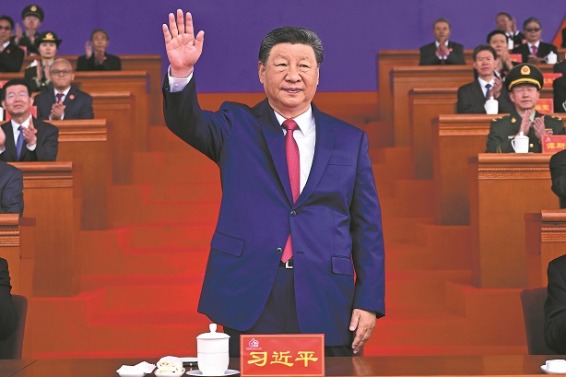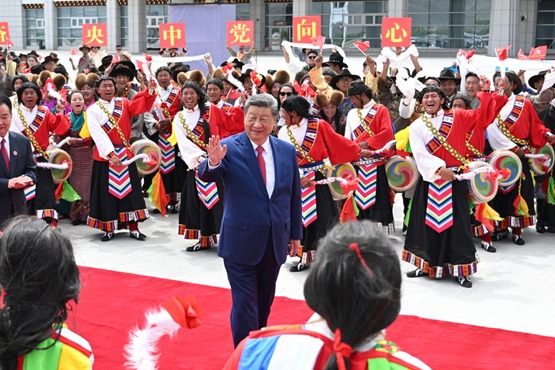'Up-or-out' rule ebbs at universities
Tenure policy ditched to ease pressure on scholars and encourage innovation

An increasing number of Chinese universities are explicitly stating that they will not implement the controversial "up-or-out" tenure-track policy for incoming faculty, signaling a potential shift away from the high-pressure academic employment practice. Under the policy, new faculty members can be demoted, transferred or even dismissed if they fail to earn a promotion within a certain period of time.
In an announcement in August, the Ocean University of China in Qingdao, Shandong province, made it clear that it would not implement the policy for recruited high-level talent. Successful candidates will be appointed as professors under the university's high-level talent program, incorporated into the establishment's permanent job system and granted doctoral supervisor status.
Meanwhile, higher education institutions — including Hangzhou Dianzi University, the Shenyang University of Technology's Liaoyang campus and the School of Marxism of the Guangxi University of Science and Technology — have recently emphasized in recruitment announcements that positions come with establishment posts and are exempt from the up-or-out requirement.
Cai Zhenhua, an associate professor at Xiangtan University's School of Public Administration, said the up-or-out policy, widely adopted in recent years, typically targets new faculty — especially young doctorate holders — who sign fixed-term contracts.
The policy imposes strict performance targets primarily focused on research achievements such as publishing papers and receiving grants. Failure to meet these goals within the contract period results in dismissal, demotion or transfer, he said.
Originally designed to incentivize high performance and prevent complacency, the policy was mainly implemented by top universities with strong platforms and attractive benefits to foster competition, he said.
However, the policy has generated significant controversy. Cai argues it exacerbates an already competitive job market for the expanding pool of doctoral graduates.
"Furthermore, its rigid application fails to account for disciplines requiring long-term research investment, such as humanities, archaeology and foundational bottleneck technologies, potentially stifling genuine innovation in favor of short-term, sometimes lower-quality outputs," he said.
The policy has also been linked to an intensely stressful and competitive environment, where young scholars endure excessive workloads to meet demanding quantitative targets, affecting their wellbeing, he said.
Last year, Song Kai, an associate professor at Nanjing Forestry University, was believed to have died by suicide due to the academic pressure from the up-or-out policy, which attracted widespread public scrutiny of the policy.
According to Sanlian Lifeweek magazine, before his death, Song told his family members that he was "extremely busy" and "too late" for a grant application. When he was feeling down, his family told Song that he should not "walk that path" (take his own life), and even though he said he would not, he eventually did so.
However, a university official said he was not demoted but was rather asked to return the 10,000 yuan ($1,393) the university had given him because he did not meet the university's requirement, which was written in his contract. The university also said he suffered from depression.
Cai said the recent abandonment of the up-or-out policy by some universities appears driven by dual objectives: directly addressing the intense pressures faced by young academics by offering greater job security, and enhancing institutional competitiveness in attracting top talent who increasingly prefer universities without such policies.
The shift away from up-or-out aligns with national policies advocating against the sole reliance on papers, titles, degrees, awards and projects in talent evaluation, which emphasize reducing burdens on young researchers and encouraging long-term, innovative research, he said.
Additionally, young talent are increasingly seeking stable positions with good benefits and manageable pressure to help them settle down after graduation, he added.
A new teacher surnamed Liang at a university in Jiangxi province said his institution does not implement the up-or-out policy as it is not a well-known university.
Liang, who has worked at the university since obtaining a doctorate in engineering last year, said competition for young teachers is already intense without the policy as they often lack the resources and experience to get projects, national funds and publish papers.
"Without the policy, young teachers' lives are already hard enough as they try to balance pressure from teaching and academic research," he said. "With the policy, it would be unbearable for us."
Meanwhile, Liang said his university just stopped offering lifelong tenure to professors, so he is worried that policies will be implemented for young teachers as well to push for academic output.




































